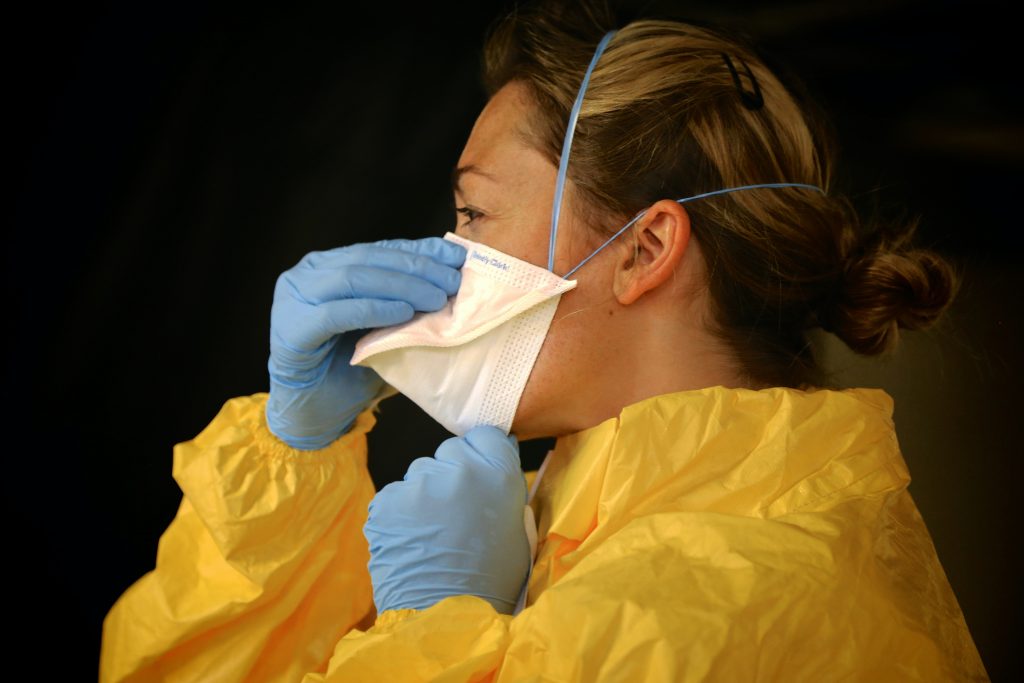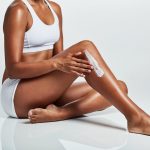Purple-red indents on the nose. Bright red chaffing across the cheeks. Large, painful cystic pimples around the mouth and chin.
For healthcare and other essential workers around the world, this is the state of their skin during the coronavirus. Thanks to wearing personal protective equipment (PPE) for prolonged periods of time, many people in these fields are facing the worst skin issues of their lives.
Healthcare workers are more likely to wear masks that are fitted and create more of an air-tight seal, such as surgical masks and N95s, said Kara Rempe, certified physician assistant at Lackawanna Valley Dermatology.
The most common skin issues include pimples thanks to the sweat, makeup (if any) and bacteria from their breath sitting on the skin; rashes due to heat and moisture or irritation from the materials the masks are made from or chemicals they’re cleansed with; and lines, abrasions and even bruising from the friction of the mask against the face for so many hours. Also, healthcare workers may even experience hyperpigmentation aka discoloration leftover from the friction.
Rempe gave Hey, Beautiful some insight on how these essential workers can treat and prevent irritation and keep their skin healthy, as well as how the rest of us should take care of our skin under masks.
Get back to basics
Rempe’s no. 1 advice to all of her patients is to cleanse, treat and moisturize. She advised healthcare workers wearing masks for long hours to either streamline their routines, or incorporate those simple steps.
If you’re breaking out from your mask, you might want to go hard on your skin, but Rempe said gentle is best.
“Harsh cleansers, moisturizers and products will only add to the inflammation and irritation that your skin is already experiencing,” she said.
Gentle cleansers such as those from Dove, Cetaphil, CeraVe or La Roche-Posay are excellent choices. Also, while you’re doing your typical AM and PM cleanses, don’t forget to cleanse after removing your mask — after washing your hands, of course. Hydration is super important, too, so be sure to always follow cleansing with moisturizer and still using your SPF in the daytime.
Keep things gentle
Avoid strong acne products, as they can cause irritation, and hold off on using retinoids for the time being. While benzoyl peroxide is effective at fighting bacteria and reducing acne breakouts and clogged pores, it can be irritating and drying, especially if you’re new to using it. Instead, Rempe recommended salicylic acid (a beta hydroxy acid or BHA) is an effective-yet-gentle way to decrease breakouts and smooth skin. Look for it in cleansers (her favorite is the super gentle CeraVe Renewing SA Cleanser) or alone in the form of wipes (try Stri-Dex Medical Pads for sensitive skin in the green box), gels or lotions, such as CeraVe SA Renewing Lotion. Also, look for products with ingredients such as niacinamide (try Cerave PM Face Moisturizer) and azelaic acid (such as The Ordinary Azelaic Acid Suspension 10%) are also gentle but will help decrease inflammation, heal breakouts and also fade leftover discoloration.
She also suggested to avoid rough exfoliants (scrubs, especially) and ingredients that aim to “peel” the skin.
“Our skin is rather agitated at this time,” Rempe said. “Adding to that agitation is only going to prolong the healing process and lead to a more frustrated, anxiety-prone state of mind.”
It’s perfectly OK to keep things like vitamin C serum or hyaluronic acid in your skin care lineup. These ingredients are unlikely to cause unwanted side effects during this time, but they will help to hydrate, provide anti-aging properties, brighten skin and fade hyperpigmentation. They also help to speed up the healing process from unwanted trauma caused by masks.
Skip your foundation
Face makeup, such as foundation, concealer, tinted moisturizer and BB and CC creams and even primer and setting spray, should be put on the back burner for the time being. Makeup trapped under a sweaty mask will only clog your pores and make the bacteria replicate even quicker, leading to more breakouts and angry skin, Rempe said. Bold lips and brows, fake lashes and colorful eyeshadow all are fine, but skip the face makeup for just a little longer, she said.
Create a barrier
The N95s are known to cause chafing and even bruising and lesions to the skin. Rempe compared wearing these masks to diaper rash or wearing a tight fitting watch or bracelet. Diapers cause chafing of the skin the same way the tight N95s do to healthcare professionals’ faces. They also dig in and cause dents the same way a watch or bracelet would.
Fortunately, Rempe said the trauma to the skin should not be permanent and long-term damage is unlikely, as it’s only occurring in the superficial layers of the skin.
In the meantime, she recommended slathering on a barrier cream prior to wearing the mask to combat this. These act as a buffer between skin and the mask without disrupting it’s suction. Barrier creams include a basic zinc oxide ointment such as Desitin or CeraVe Healing Ointment. The latter is petrolatum-based, won’t feel greasy and is a great options for eczema-prone or sensitive skin. After taking off a mask, cleanse, moisturize and apply more ointment, including the aforementioned CeraVe, or Aquaphor, Vaseline, La Roche-Posay Cicaplast Baume or La Roche-Posay Toleraine Double Repair Face Moisturizer to soothe irritated skin.
Cool down
Use a cool compress or ice mask to help reduce skin discomfort and ease inflammation caused by N95s. Cold jade rollers are another idea, but make sure they are cleaned and sanitized regularly. These cool compress and facial tools are not only beneficial for skin but also will help create a stress-reducing ritual.
“Allow yourself to zen out after a long shift with some self-care,” she said.
For the general public
Fabric masks that many non-healthcare essential workers and the general population are wearing are softer and not as constricting, so the bruising and discoloration is less likely to occur. However, assorted fabrics can irritate the skin, especially if they’re washed with fragrant detergents and fabric softeners. Rempe recommended avoiding fabric masks made from synthetic materials. Instead, opt for a cotton mask since it’s breathable, soft and natural. However, because of cotton’s breathability, it doesn’t filter the air as well and may be less effective. She suggested to double the fabric when using or making a cotton mask for added protection and effectiveness. Also, when washing the masks, use fragrance-free laundry detergents and avoid fabric softener when possible.
While the rest of us wearing fabric or other soft masks don’t have to come up with completely new skin care routines, incorporating some of the tips above will never hurt. Keeping your skin care simple and gentle is the overall goal, Rempe said, as our skin is our largest organ and we need to treat it right. In addition to the moisturizers and other products mentioned to help keep skin healthy and hydrated, drink plenty of water to hydrate from the inside out.

Gia Mazur is an award-winning staff writer and beauty obsessive who joined The Times-Tribune’s Lifestyles department in 2015. She’s a product enthusiast who can’t live without an eyelash curler. A proud Virgo, Charlotte Tilbury Matte Revolution Lipstick in Pillow Talk is her go-to. Contact: gmazur@timesshamrock.com; 570-348-9127; @gmazurTT




